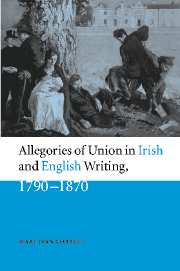 Allegories of Union in Irish and English Writing, 1790–1870
Allegories of Union in Irish and English Writing, 1790–1870 Book contents
- Frontmatter
- Contents
- Acknowledgments
- Introduction
- Chapter One Public affections and familial politics: Burke, Edgeworth, and Ireland in the 1790s
- Chapter Two Allegories of prescription: engendering Union in Owenson and Edgeworth
- Chapter Three Troubling others: representing the immigrant Irish in urban England around mid-century
- Chapter Four Plotting colonial authority: Trollope's Ireland, 1845–1860
- Chapter Five England's opportunity, England's character: Arnold, Mill, and the Union in the 1860s
- Afterword
- Notes
- Bibliography
- Index
Chapter Two - Allegories of prescription: engendering Union in Owenson and Edgeworth
Published online by Cambridge University Press: 22 September 2009
- Frontmatter
- Contents
- Acknowledgments
- Introduction
- Chapter One Public affections and familial politics: Burke, Edgeworth, and Ireland in the 1790s
- Chapter Two Allegories of prescription: engendering Union in Owenson and Edgeworth
- Chapter Three Troubling others: representing the immigrant Irish in urban England around mid-century
- Chapter Four Plotting colonial authority: Trollope's Ireland, 1845–1860
- Chapter Five England's opportunity, England's character: Arnold, Mill, and the Union in the 1860s
- Afterword
- Notes
- Bibliography
- Index
Summary
When some members of the Irish parliament proposed in 1773 to tax Irish landholders living in England, Edmund Burke opposed the plan. Writing to an Irish peer in his “Letter to Sir Charles Bingham” (1773), Burke speaks of “the happy communion” that should obtain between England and Ireland, and the proposed levy as an affront to it: “What is taxing the resort to and residence in any place, but declaring, that your connexion with that place is a grievance? Is not such an Irish Tax, as is now proposed, a virtual declaration, that England is a foreign country, and a renunciation on your part of the principle of common naturalization, which runs through this whole empire[?]” In Burke's view, for the Irish to tax English absentees means to treat them as aliens rather than as fellow subjects under the united imperial crown; acting as if “England is a foreign country” denies it the status of kin. Burke's objective, by contrast, is to stress the identity of interests between the two, as in the analogous rhetoric of family and marriage, rather than their differences or conflicts. He thus masks structural inequality between Ireland and England by emphasizing the commonality among the constituent parts of Great Britain.
- Type
- Chapter
- Information
- Allegories of Union in Irish and English Writing, 1790–1870Politics, History, and the Family from Edgeworth to Arnold, pp. 51 - 81Publisher: Cambridge University PressPrint publication year: 2000


